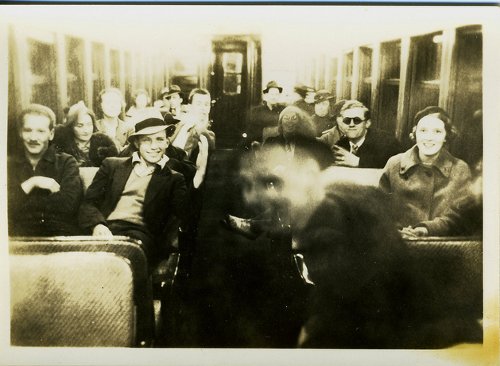
Note: This excerpt, condensed from the original, was taken from Masterful Personality by Orison Swett Marden, a book which was published in 1921 and is worth reading in its entirety.
“A man is not all included between his hat and boots,” said Walt Whitman.
There is something in a man which does not inhere in his flesh, which is not in his brain, not in his body, something which eludes the biographer and evades the camera, something we feel, something which radiates from his presence, a real vital force, as mysterious as that of electricity and as difficult to understand. We call it a man’s atmosphere, or magnetism, and it extends beyond his physical body.
In some personalities it is much more pronounced, more extended, than in others. When we go near some people who are very magnetic we positively feel their impelling presence before we get near enough to touch them. A subtle radiation of real force surrounds them like an aura.
There are people who claim that what they term the “human aura” is an electrical emanation from the body which takes various forms according to the character and personality of the individuals.
Call it aura, magnetism, or whatever you please, this indescribable, indefinable, mysterious, personal atmosphere is a tremendous power. It draws people to or drives them from us. A famous blind, deaf-mute said she could feel a distinct force when certain people came near her which either attracted or repelled her, according to the character of the person. She could sense their moral status and, her attendants said, would instinctively shrink, as though something was going to harm her, whenever an evil person came near her. She could feel their character.
Everyone has an atmosphere peculiar to himself, pervaded by all of his characteristics. We cannot radiate anything unlike ourselves or our ideals. The qualities you radiate will either attract or repel people. Your atmosphere will affect your career.
We all know how vividly we feel the personality of certain persons after they have passed out of our homes, or even have passed out of life. There remains in the homes of those who have left us and in the places they habitually frequented, a certain something, a presence which we cannot explain, but which we feel very keenly. The ideal mother lives long in the home after her body has been laid away in the grave. Members of the household distinctly feel her presence, sometimes for many years. A similar thing is true of a loved child after death. This is not mere imagination. There is something left from the personality which we feel for a long time after a dear one is taken from us.
Those of us who have visited the homes of great characters like Washington, Shakespeare, Beethoven, and Roosevelt have felt their personality very decidedly. An individualized something seems to radiate from the furniture, the draperies of their sanctums—the desk, the chair they occupied, the library table, the silent piano, or other musical instrument.
There is, indeed, an atmosphere, an aura of personality around strong, magnetic characters which time cannot erase. With my children I have been privileged to visit the home of Theodore Roosevelt since he passed away (as I had often done when he was alive) and in viewing the wonderful articles in the celebrated Trophy Room, I could feel this great man’s presence among his treasures almost as plainly as though he were indeed present in life. His remarkable personality seemed to cling not only to everything about the home, but even to the great outdoors he so loved—the grounds, the woods where his marvelous energy was so often employed in wielding the ax and in athletic sports; it even pervaded the little church where he had habitually worshiped.
We all have felt the quickening of ambition, the subtle influence due to the active, forceful, positive vibrations which fill the atmosphere of the places of business of successful men. If a business office is dominated by a powerful personality, we feel the dominating force all through the establishment. If, on the other hand, the head of the concern is a weak, undecided, vacillating character, if he lacks force, energy, and push, everyone who enters the place feels the negative vibration.
Remember that the world will feel you if you are a real force. If you generate power you will radiate it. Others will know whether you are a little picayune dynamo or a powerful one, whether you can pull a big load or a little one, whether you are a giant or a pygmy, a winner or a loser. You can only radiate the force which you generate.
Nothing but weakness can come from a weak man, no matter how much he poses or tries to make a favorable impression.
Many people are like the moon, cold, lifeless bodies with no atmosphere, nothing which attracts. They do not radiate warmth or soul sunshine. Their personalities seem to be auraless. Other personalities are like the sun, radiating warmth and light, joy, and gladness.
William Dean Howells said of Longfellow, “He never came but he left our house more luminous for his having been there.” This radiation of spiritual warmth and light that characterized Longfellow was true also in an eminent degree of two of our greatest and best loved American divines, Henry Ward Beecher and Phillips Brooks.
One could not be in the same room with Beecher without feeling that he was in the presence of some powerful, spiritual force that radiated good cheer, hope, courage, love. It used to be said in Boston that no matter how gloomy or depressing the weather, when Phillips Brooks passed by on the street people felt as if the sun had shone out and dispersed all the clouds. There was something that radiated from this marvelous personality which was felt by everyone who came near him. I have often seen strangers passing him in the street, turn round and look at him, with wonder and admiration in their faces, conscious that they had seen a magnificent specimen of manhood.
“What a gift it is,” said Beecher, “to make all men better and happier without knowing it! These roses and carnations have made me happy for a day. Yet they stand huddled together in my pitcher, without seeming to know my thoughts of them, or the gracious work they are doing. And how much more is it to have a disposition that carries with it involuntary sweetness, calmness, courage, hope, and happiness. Yet this is the portion of good nature in a large-minded, strong-natured man. When it has made him happy, it has scarcely begun its office. God sends a natural heart-singer—a man whose nature is large and luminous, and who, by his very carriage and spontaneous actions, calms, cheers, and helps his fellows. God bless him, for he blesses everybody!”
We all know people in whose presence we experience a sense of peace, of harmony and well-being. We feel the benign influence of these poised, radiant souls enveloping us. Everybody who comes in contact with them is enriched by the graciousness and charm of their personality. If you have not developed such a personality, at least in some degree; if people do not feel the fragrance of a beautiful character radiating from you, then you have not lifted your life to the level of your highest expression. No matter how much money you may have piled up, or what you have achieved, you have not been a success in the fullest sense, because your character is not balanced, your life is not a real masterpiece. You may have made a success as a specialist, but not as a man.





